Business in Burkina Faso, Ouagadougou, Cotton

Burkinabe Economy, Gold. Foreign Trade of Burkina Faso
- Introduction to the Republic of Burkina Faso (West Africa): the
country of upright men
- Joseph Ki-Zerbo: Africa, the cradle of humanity has a history and gave birth to History
- Burkinabe economy
- Case Study:
- International Arts and Crafts Fair (Ouagadougou)
- Minata Kone (businesswoman)
- International Trade of Burkina Faso
- Business Opportunities in Burkina Faso
- Agriculture
- Mining
- Industry
- Tourism
- Services sector
- Real Estate and infrastructures
- Access to the Burkinabe market
- Business Plan for Burkina Faso
The objectives of the subject “International Trade and Business in Burkina Faso” are the following:
- To analyze the Burkinabe Economy and Global Trade
- To know the trade opportunities in Burkina Faso
- To explore the Burkinabe trade relations with the country of the student
- To know the Burkinabe Trade Agreements
- To develop a business plan for the Burkinabe market

The Subject “Foreign Trade and Business in Burkina Faso” belongs to the following Online Programs taught by EENI Global Business School:
Master in Business in Africa, International Business, Foreign Trade.

Doctorate in African Business, World Trade.
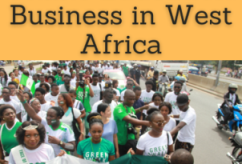
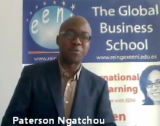
EENI Partnerships with Educational Institutions
Languages:  or
or  Burkina Faso
Burkina Faso  Burkina
Burkina  Burkina Faso.
Burkina Faso.
- Credits of the subject “Doing Business in Burkina Faso”: 1

- Duration: one week

International Trade and Business in Burkina Faso
Burkina Faso: one of the regional economies that have implemented more reforms.

Transport and Logistics in Burkina Faso
- Trans-African Corridors;
- Nearest ports
- Port of Abidjan (Ivory Coast)
- Port of Lomé (Togo)
- Port of Cotonou (Benin)
- Port of Tema (1,000 kilometers)


Trade Agreements and Preferential Access of Burkina Faso
- Burkina Faso and the West African Economic Area
- Community of Sahel-Saharan States (CEN-SAD)
- African Continental Free-Trade Area
- Economic Community of West African States (ECOWAS)
- West African Economic and Monetary Union (WAEMU)
- Burkina Faso-EU Trade Relations;
- AGOA
- Niger Basin Authority
- OHADA
- G5-Sahel
- Arab Bank for Africa (BADEA)
- Global System of Trade Preferences among Developing Countries (GSTP) - accession process

- WTO
- GATS
- Agreement on Sanitary Measures
- Agreement on Technical Barriers to Trade
- Agreement on Preshipment Inspection
- Agreement on Safeguards
- Trade Facilitation Agreement
- WCO
- Hamburg Rules (Sea)

- Economic Commission for Africa
- African Union
- AU Convention on Combating Corruption
- AUDA-NEPAD
- Africa Agriculture Development Programme
- African Development Bank
- China-Africa Cooperation
- Africa-India Cooperation
- Africa-BRICS
- Africa-Japan Cooperation
- Africa-South America Summit


- UN
- WB
- WTO
- IMF
- Burkina Faso (West Africa) shares borders with Mali, Niger, Benin, Togo, Ghana, and Ivory Coast
- Area of Burkina Faso: 274,200 km²
- Burkinabe Population: 16 million people
- Burkina Faso is one of the poorest countries
- The official language of Burkina Faso is French
- Local languages: Moore, Fulfulde, Dioula
- Independence of Burkina Faso: 1960 (from France)
- Burkina is a landlocked African Country
- Capital of Burkina Faso: Ouagadougou (1.5 million)
- Largest cities: Bobo-Dioulasso, Banfora, Dédougou, Tenkodogo, Koudougou, Kaya, Fada N'Gourma, Ouahigouya, Manga, Dori, and Gaoua
- The Historian Joseph Ki-Zerbo was born in Burkina Faso
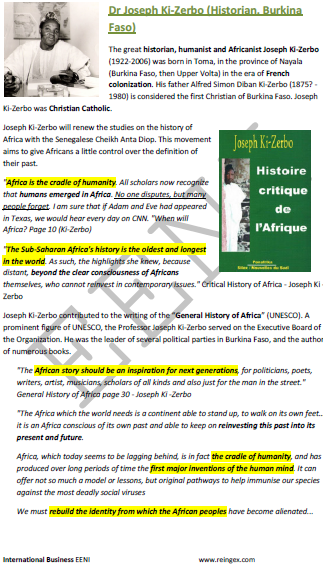
Religions in Burkina Faso:
- Islam (65% of the Burkinabe population, 8 million)
- 30% of the Burkinabe are Christians (with Catholic majorities)
- African Traditional Religions


More information about Burkina Faso (EENI African Business Portal).
Burkina Faso belongs to the West African Economic Area.
Master in International Business in Burkina Faso
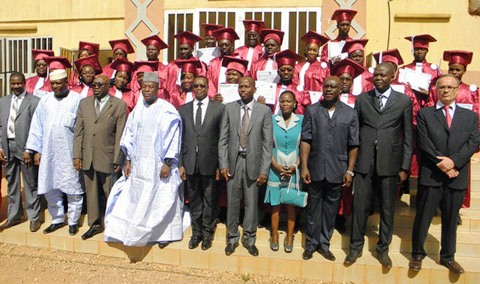

Economic Profile of Burkina Faso:
The Republic of Burkina Faso established the development strategy for the future years to opening to the regional and global markets. Burkina wishes “to become a development centre in West Africa.”
- Burkinabe Currency: West African CFA Franc
- Agriculture: 90% of the Burkinabe population
- Main cash crop in Burkina Faso: cotton
- Top Burkinabe exports are cotton and gold (68%)
- The main commodities exported by Burkina Faso are cotton, nuts, gold, cattle, goats, sheep, sesame seeds, fruits, and vegetables
- Burkinabe GDP growth: 7%
- Composition of the Burkinabe GDP: agriculture 35%, industry 23%, services 42%
- The main sectors of the Burkinabe economy are agriculture, trade and mining
- Inflation in Burkina Faso: 3%
- Regional Trade with other ECOWAS and WAEMU countries is very low, limited to agricultural products
- Business index (WB): 154
- Positive liberalization of the Burkinabe economy
- Burkina is open to the foreign investors
- Events:
- International Arts and Crafts Fair (SIAO)
- Pan-African Film and Television Festival of Ouagadougou
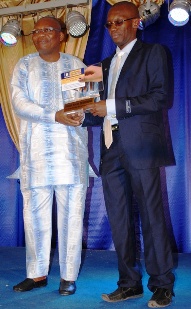
Ouandaogo Abdoul Karim (Student of the Master in International Business, University of Ouagadougou & EENI) winner of a WAEMU regional award.
National Trade Office ONAC. One of the main tasks of the ONAC is to promote the international trade between Burkina Faso and the rest of the World.
Global Trade and Business in Burkina Faso
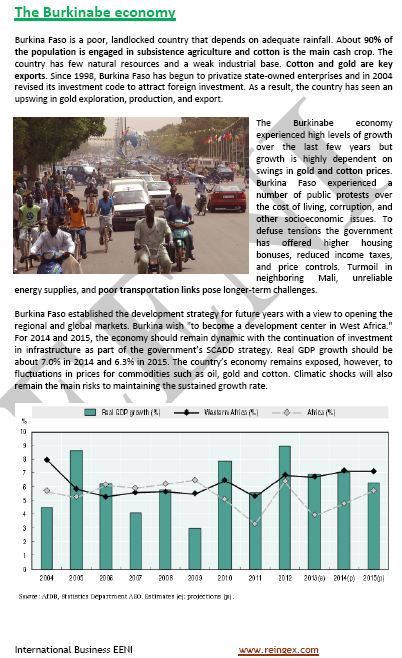
Group Soyaf (Burkina). Created in 1982 by Mr Salif Yameogo (Managing Director), the Group Soyaf has become one of the biggest holding companies with international standards in West Africa and more specifically in Burkina Faso. In this new millennium, the Group Soyaf drew Burkina Faso several large multinationals whose Telecel International Group in the area of communication and the Framlington Group, a Group of investors.
TELECEL (Burkina). Founded in 1987 by Miko Rwayitaré and owned by 80% to Orascom Telecom (Egypt) since 2000, Telecel International is a multinational Group based in South Africa and Geneva. With its years of experience in Africa, Telecel has developed a single expertise in the study of projects, the establishment and operation of cellular networks in the African continent. In all its activities, Telecel International combines national private investors in the shareholding of its associated companies.
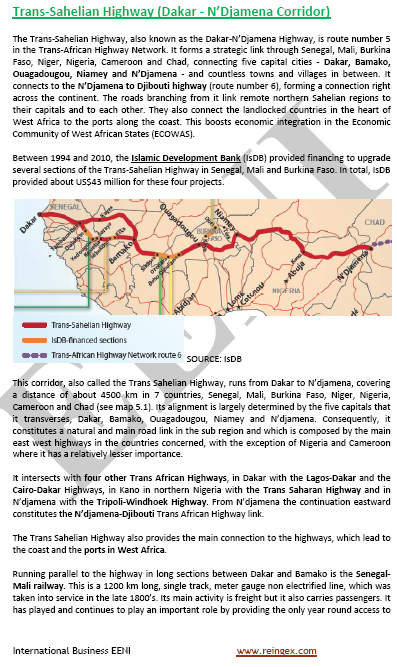
Two Burkinabe students receiving the Diploma of Master of Science in International Business with Pedro Nonell (EENI President):
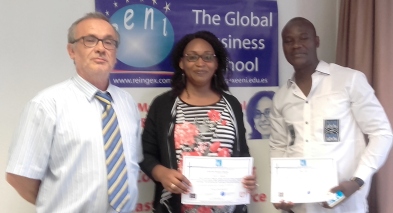
(c) EENI Global Business School (1995-2024)
We do not use cookies
Top of this page


